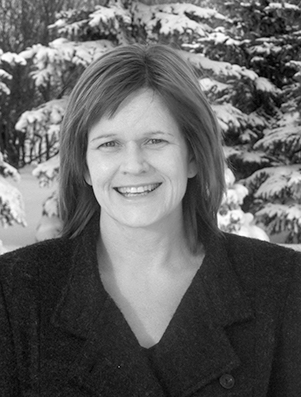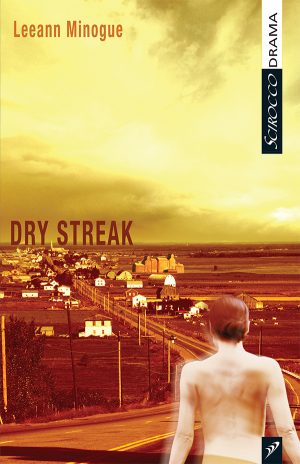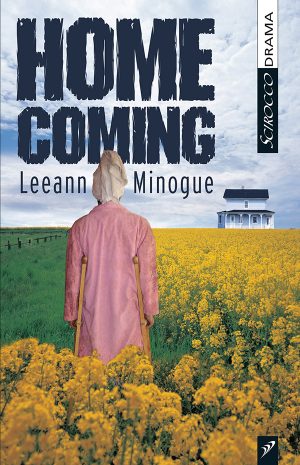Posted August 8, 2025
The Interview – Leeann Minogue
Leeann Minogue
Leeann Minogue‘s plays include Dry Streak, which was nominated for a Saskatchewan Book Award in 2006, and Homecoming. Leeann lives with her husband and son on a grain farm in southeast Saskatchewan.
Leeann, the premise of your play Dry Streak is very funny: It’s 1988, and John, a farmer’s son, brings his girlfriend Kate home to the farm to live. Kate is a city girl, a vegetarian, a free spirit, an obvious misfit in the fictional community of Stony Valley, Saskatchewan. What happens when city meets country?
That’s where the humour comes—when two cultures clash. Rural people watching the play are sophisticated enough to know that it’s funny to laugh at themselves. People in rural areas know we’re not dressing or living the same as people in cities. In the play, the culture clash is played for humour, with—hopefully—both urban and rural people seeing that it’s funny. We’re not really laughing at anyone; we’re just laughing at the differences.
Recently, my son’s Grade 12 class read Dry Streak in school, and that was really fun. He kept hoping he’d have an inside edge on some of the questions, but somehow it didn’t work out. I didn’t understand all the themes in the same way the teacher did!
To follow up, I want to ask you about “urban vs. rural” in real life. Most writers in Canada live in urban centres, but you have built a career in a small farming community: Griffin, Saskatchewan. Can you tell us about the challenges and advantages of being a writer in a rural location?
Let’s start with the advantages. There’s a real niche for rural plays. There are many rural dinner theatres looking for material. There are outdoor summer theatres looking for rural-based material, and there aren’t a lot of people writing rural humour. (There’s some rural nostalgia, there’s some rural drama, but there’s not a ton of rural humour made for this market.) So that’s the advantage. And of course, the disadvantage is not being able to see shows or be part of a theatre community. I live ninety miles from the nearest professional theatre. It’s hard to get to shows, and it’s hard to spend time with other writers.
But I think that’s one of the things that gives your work power: because you live the farm life, you understand the issues people face, and you can portray rural communities with authenticity.
In my twenties, I lived in Regina, and I thought I understood rural life because I had grown up on a farm. But until you live there, you really don’t. The things that I thought I understood in Regina are just not the way it turned out to be when I moved back to rural Saskatchewan.
Your play Homecoming is also set in Stony Valley, and it tackles the subject of a family in transition, as the parents retire and the son and his wife move home to take over the farm. This time the conflict is generational, between the old ways and the new ways. Why did you want to write about this subject?
This topic is one of the biggest problems in farm management. How do farmers turn their farm over to the next generation in a way that’s fair to the kids that stay on the farm, and to the kids that move off the farm? And also, how do father and son—usually son, but sometimes daughter—how do they work together to make this transition work? There are going to be clashes. And there’s always humour in a clash! But it’s also real, because it’s so hard for farmers (and anyone with a family business) to walk away and let the son be in charge, or to stand back and watch the son do things wrong.
Playwriting isn’t the only kind of writing that you do—you were the editor of Grainews for many years. What was that like?
Your readers might not be too excited about Grainews, because it’s a publication designed to provide technical information to farmers. But one very fun job I had was writing a regular column in Country Guide that followed a fictional farm family. I did that for five or six years, telling stories about an intergenerational farm family. It was a serial; the stories would carry on from one episode to the next. You know, someone would get married and then next time the wife was in the story, and I really enjoyed that. At one point I killed off a character, the older farmer, because I thought, you know, all this time has gone by, surely everyone can’t be still alive. So I killed that character and I was really sad afterward because he had been so funny and I didn’t have him there anymore. I was surprisingly sad after that! I’m trying to think of how I can bring some of that material onto the stage.
Do you want to give us a sneak peek of a project you’re working on now?
I haven’t written a play for quite some time, but I have something on my hard drive that I think is promising. And this time, instead of setting the play in a hot, dry summer, I’m working with a really cold, bleak winter. It’s about rural isolation and how you can break through that to find your community. But of course, with comedy and death and all of that stuff.
-
Dry Streak
Price range: $9.99 through $14.95 -
Homecoming
Price range: $9.99 through $14.95



